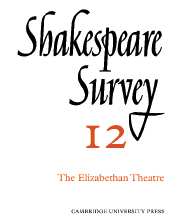Book contents
- Frontmatter
- The Open Stage: Elizabethan or Existentialist?
- The Lantern of Taste
- Was there a Typical Elizabethan Stage?
- On Reconstructing a Practicable Elizabethan Public Playhouse
- The Discovery-space in Shakespeare’s Globe
- ‘Passing over the Stage’
- The Actor at the Foot of Shakespeare’s Platform
- Elizabethan Stage-Practice and the Transmutation of Source Material by the Dramatists
- The Maddermarket Theatre and the Playing of Shakespeare
- Actors and Scholars: A View of Shakespeare in the Modern Theatre
- Cleopatra as Isis
- Shakespeare’s Friends: Hathaways and Burmans at Shottery
- Illustrations of Social Life II: A Butcher and some Social Pests
- International Notes
- Shakespeare Productions in the United Kingdom: 1957
- The Whirligig of Time, A Review of Recent Productions
- The Year's Contributions to Shakespearian Study 1 Critical Studies
- 2 Shakespeare’s Life, Times and Stage
- 3 Textual Studies
- Books Received
- Index
- Plate Section
The Year's Contributions to Shakespearian Study 1 - Critical Studies
Published online by Cambridge University Press: 28 March 2007
- Frontmatter
- The Open Stage: Elizabethan or Existentialist?
- The Lantern of Taste
- Was there a Typical Elizabethan Stage?
- On Reconstructing a Practicable Elizabethan Public Playhouse
- The Discovery-space in Shakespeare’s Globe
- ‘Passing over the Stage’
- The Actor at the Foot of Shakespeare’s Platform
- Elizabethan Stage-Practice and the Transmutation of Source Material by the Dramatists
- The Maddermarket Theatre and the Playing of Shakespeare
- Actors and Scholars: A View of Shakespeare in the Modern Theatre
- Cleopatra as Isis
- Shakespeare’s Friends: Hathaways and Burmans at Shottery
- Illustrations of Social Life II: A Butcher and some Social Pests
- International Notes
- Shakespeare Productions in the United Kingdom: 1957
- The Whirligig of Time, A Review of Recent Productions
- The Year's Contributions to Shakespearian Study 1 Critical Studies
- 2 Shakespeare’s Life, Times and Stage
- 3 Textual Studies
- Books Received
- Index
- Plate Section
Summary
The burden of Shakespeare criticism has become so grievous that no one today can undertake a general study of the dramatist in the confident belief that he has read, and remembered, everything of value that has already been written concerning his theme. He will be likely, therefore, to come to a point of disregard, trying to see the works by his own light, aided only by those writers who have exercised a special influence upon him. This might not be altogether a bad thing if there were not also in our time a strong desire to systematize a writer’s outlook, to find in him a code or firmly held attitude that we can take for our own. Thus in general studies there is a powerful urge to devise a pattern agreeable to the critic and, with some neglect of other current views, to assert its dominance in Shakespeare. The danger is less great in studies of individual plays: there it is possible, though not easy, to familiarize oneself with a large part of what has already been written, and this should discourage one from arriving too quickly at a conclusion that claims definitive rank. Moreover, the fact that the critic is restricting himself to a single play limits the extent of his claim. It is modester and safer to interpret a play than to present ‘Shakespeare’ in a nutshell.
- Type
- Chapter
- Information
- Shakespeare Survey , pp. 131 - 139Publisher: Cambridge University PressPrint publication year: 1959

